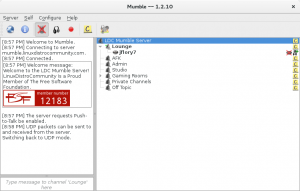Mumble is a popular, free and open source VoIP (Voice over IP) client used by various communities across the world. Mumble is particularly well-known among gaming communities, especially games that take advantage of its positional audio feature.
Mumble is useful because of its focus on low latency communication and comes with several configuration options to optimize bandwidth usage. Additionally, Mumble prides itself on being private and secure by encrypting communication using public and private key authentication between client and server.
In Fedora 21, the original maintainer was no longer able to maintain the package for Fedora. But now, a new maintainer, John Popplewell (fedpop), has stepped up to maintain Mumble again for Fedora 22 and Fedora 23. As of now, it is in the stable repositories for Fedora 23, but still in testing for Fedora 22 (you can help test it!). We interviewed John about why he loves Mumble and decided to maintain the package for Fedora users.
When did you first encounter Mumble?
“I first came to use Mumble to communicate with my friends while playing games. While many used proprietary options, I found Mumble to do a very good job with low latency and good voice quality. Some games offer positional audio which can be a big draw for some games. I’ve always preferred open source options, and I like that the user’s privacy is respected.”
Why did you decide to maintain Mumble?
“Mumble had been out of the official repo for a long time and I had been using my own patched SRPM to generate the binaries. I saw a lot of requests for Mumble to return to Fedora. I learned about COPR and shared my RPM with people. Upon receiving a lot of positive feedback, I learned all about Fedora Packaging and submitted a review request.”
Help test Mumble on Fedora 22
Are you still running Fedora 22 but want to get your hands on Mumble? You can help get the package tested and approved for the stable Fedora repositories and get to use it before it is available in the stable repositories. The Fedora 22 Mumble package is currently awaiting testing feedback in Bodhi, the platform for testing updates for software in Fedora.
To help test for Fedora 22, you can run the following command from a terminal window to install Mumble from the testing repositories.
$ sudo dnf install mumble --enablerepo=updates-testing
After this, you will be able to install and use Mumble ahead of everyone else. Make sure if you use the test builds, leave feedback on the Bodhi submission while logged into FAS to help get it approved for the Fedora 22 stable repositories. If you’ve never tested a package before, this is also a great opportunity to get the In Search of the Bull badge!
If you are using Fedora 23, you have nothing to worry about. Mumble is already available in the stable repositories and you can install it like any other package.
Future Plans
The next major release of Mumble will be 1.3, which has support for QT5 and many new features like perfect-forward-secrecy and client-side user volume adjustment. In Fedora, a Git snapshot will be hitting Rawhide soon. Additional plans by John are to include support for the ICE RPC. ICE is currently disabled because it is not packaged for Fedora. The RPC support is useful for integrating Murmur into applications like websites.







Christian
Great 🙂
Alexandre
What a geat news !
Fedora gamers really missed it, so thank you a lot !
number80
Correction, Mumble was dropped because nobody stepped up to maintain ICE a critical dependency for Mumble.
Hakamy
is this something like Ekiga?
Calinou
No, not really, Mumble is intended for gaming, whereas Ekiga targets general-purpose communication. Mumble also can’t perform any video communication, it does only audio.
Sean Callaway
So glad to see that Fedpop was able to take over. I was watching the thread on trying to resurrect it with great interest.